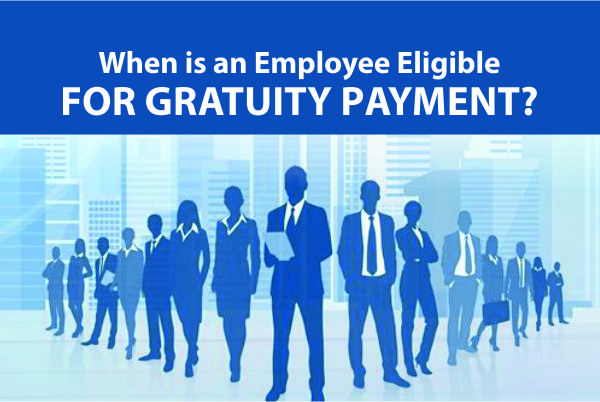When is an Employee Eligible for Gratuity Payment?

Working long enough with a company will expose you to quite a few financial terms. One such common word is “gratuity”. Although, it might sound fancy for a lot,it actually refers to a kind of monetary benefit some employees receive. But what is gratuity and who are the ones that get this benefit?
As an employee, if you have spent some time with a company, then you are eligible for “gratuity”. However, if you do not have an idea about the same, here is a detailed insight about the same.
What Is Gratuity?
Gratuity is a sum of money that an employee usually gets from the employer after completing a stipulated time frame with the company. This amount of money is usually given as a token of appreciation for their service.The employee gets the gratuity only when they are supposed to leave the company.
Some of the factors which tend to decide the amount of gratuity are the length of employment and salary. However,not everyone is eligible for gratuity and there are some universal governing norms. Wondering how you can be eligible for the gratuity as an employee who has served for a company?
Eligibility Factors For Gratuity Payment
Some of the eligibility factors that decides whether an employee is eligible for gratuity or not are:
Completing Your Tenure
The most common requirement is completing a minimum service period with your employer. This is usually around five years of continuous service. Months don’t always count – some places require a minimum of six months worked in a year to consider it a full year of service. Usually. Companies will have their own policy for gratuity payment and this tends to differ from one company to the other. The tenure for the gratuity remains same for all.
Exceptions to the Rule
There are some situations where you might qualify for gratuity even if you have not yet hit the five-year mark. These are usually unfortunate events or accidents where one does not have any control. Some of these scenarios are:
- Death: If you sadly pass away while employed, your gratuity is paid to your beneficiary. The reason for the death is inspected in some cases , however for most companies this does not impact much.
- Disability: If you become permanently disabled due to an accident or illness, you may be eligible for gratuity. However, each and every company has their own norms regarding the same. In some cases you might not receive the entire amount as gratuity and eligible for part amounts.
Beyond the Basic Rules
The five-year rule is a general guideline, but there is more to the story that you need to know about. Here are some additional factors to consider:
- Company Policy: Some companies might offer gratuity under more generous terms than the law requires. For this you will need to check your employment contract or company handbook for details.
- Industry Standards: In some industries, there might be unwritten rules about gratuity eligibility. To have the best idea about this you can get in touch with the human resources department.
How Much Gratuity Can You Expect?
The amount of gratuity that you are subjected to depends on a few factors;
Your Salary
Gratuity is usually calculated based on your last drawn salary, not your entire salary history. The longer you have been working with the company, the higher your gratuity amount will likely be. There are often formulas used to calculate the exact amount based on your salary and service years.
Taxes and Gratuity
Gratuity is generally considered taxable income. However, some countries might offer tax exemptions for gratuity payments up to a certain limit. The best idea is always to check with a tax advisor for the latest regulations in your area.
Conclusion
Gratuity stands as a valuable financial perk when transitioning from a job. It’s crucial to grasp the eligibility criteria and calculation methods to ensure you receive your due. Should you have any queries regarding gratuity, do reach out to your human resources department without hesitation. Want to know more about what one means by gratuity and how you can put the same into use? Mithras Consultants is one of the best options in the market and you can contact them today!

 Call Us
Call Us Whatsapp Us
Whatsapp Us